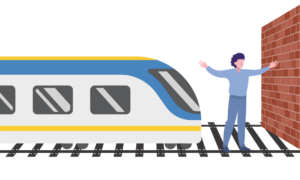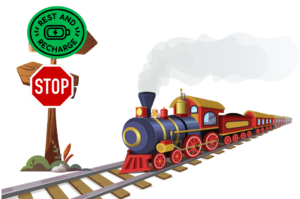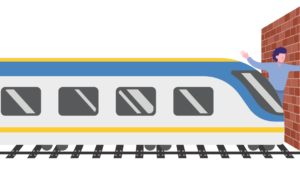Are you stopping a speeding train?
Are you someone who sees the challenges that others are getting into and finds yourself involved in their worlds, trying to stop them?
Are you someone who, when you see someone struggling, you feel an overwhelming need to relieve their struggles?
Who shortly afterwards finds yourself exhausted and the other person feeling irritated with you?
Who frequently feels that others do not care enough to do the same for you?
Perhaps they get angry with you? Tell you to stop taking over?
Or maybe, they stop talking to you?
Whilst there are some situations we HAVE to become involved in (suicidal ideation, risk to life or risk of harm to others) there are some situations that we can find ourselves becoming over involved in, that do not require us.
I like to refer to this as speeding train analogy.
We can find ourselves applying this in friendships, work situations and even relationships. Particularly if we have:
- Experienced the same issues ourselves, and do not want others to experience it
- Have watched someone else go through it, and feel we could save them time, energy or mistakes
- Found ourselves to have high level of empathy and wanting to help others
- Find your own challenges too difficult to make sense of, so distract yourself with others
Speeding train analogy never comes from a bad place. Most frequently it comes from a place of love.
So, how does it work?
I want you to imagine that the person you see struggling is the speeding train.
You can see them hurtling down the tracks at break neck speeds.
At the end of the tracks, you know that there is a wall.

And, when they hit it, you know there will be huge consequences.
So, with a level of foresight that we believe the other person does not have, we decide to climb in front of the train.
We might find ourselves:
- Trying to dictate to them what they should do
- Trying to do things for them
- Trying to take over
- Telling them what they ‘should’ ‘must’ ‘have’ to do
- Taking over and making plans, bookings or appointments for them
- Becoming frustrated that they do not take the steps that we tell them to take
- Becoming angry that they are not thinking about us as much as we think about them

However, we can find that as we stand in front of the train, using all our strength to ‘save’ the other person from their mistake/error/poor judgement (insert here), that we find ourselves running out of steam.
Our self-care might drop, we may find ourselves fixating on them 24 hours a day, feeling that if we step back then they will crash into the metaphorical wall.
So, even though we are tired, we keep holding our arms out, until:
- They veer off in a different direction
- Their issue resolves and they walk away never knowing our sacrifice
- We get angry and snap at them that they don’t appreciate us
- They become annoyed at us for interfering and cut themselves off
- We get squished.
In relationships, friendships and work scenarios, we can find that these situations bring about exhaustion, division, misunderstanding and even bitterness. In worst case scenarios, we can find ourselves never talking again. For the person who stood in front of the train, they can feel let down and unappreciated. For the person who was struggling they can feel that they were railroaded, pushed and coerced. We can quickly see how an action that came from love can cause so much division.
So, what do we do instead?
Have you ever noticed that your greatest growth in life came from your greatest PAIN.
That the biggest learning curves we often have, come from our greatest mistakes, failures, errors or falling backwards into a heap and navigating moving forward.
Have you ever considered, that when we stand in front of the speeding train that we might be:
- Preventing someone from gaining valuable insight and lessons to grow from?
- Preventing them from gaining wisdom which may change the trajectory of their life for the better?
- Pushing them into a new direction, without the wisdom gained, to repeat the same mistake again?
So, what would happen, if instead of charging in, standing in front of the train we instead:
- Asked the question ‘Am I listening or am I helping?’
- Offered space for the friend/family member/partner/ colleague to rest and recharge with you
- Created opportunities for them to be able to breathe and talk if they need to
- Stopped trying to live their life for them, and instead, offer sign posting to organisations should they need them
- Offer to come to appointments with them, as moral support, rather than trying to do it for them
- Upped our self-care, so that if their train crashes, we have the energy and reserves to be able to support them?

Our greatest lessons in life are NEVER learnt when someone does something for us.
However, we do remember those who stood by our side DURING the greatest lessons in life.
Something to mull over.
Want to learn more?
If you want to learn more about mental health you can join our Level 4 training (here) or keep an eye out for our new courses coming soon (here).
© Dandelion Training and Development – All Rights Reserved
Further help
For more articles about mental health visit – ARTICLES
To learn more about child and adolescent mental health visit – COURSES
For resources to support child and adolescent mental health visit –RESOURCES


